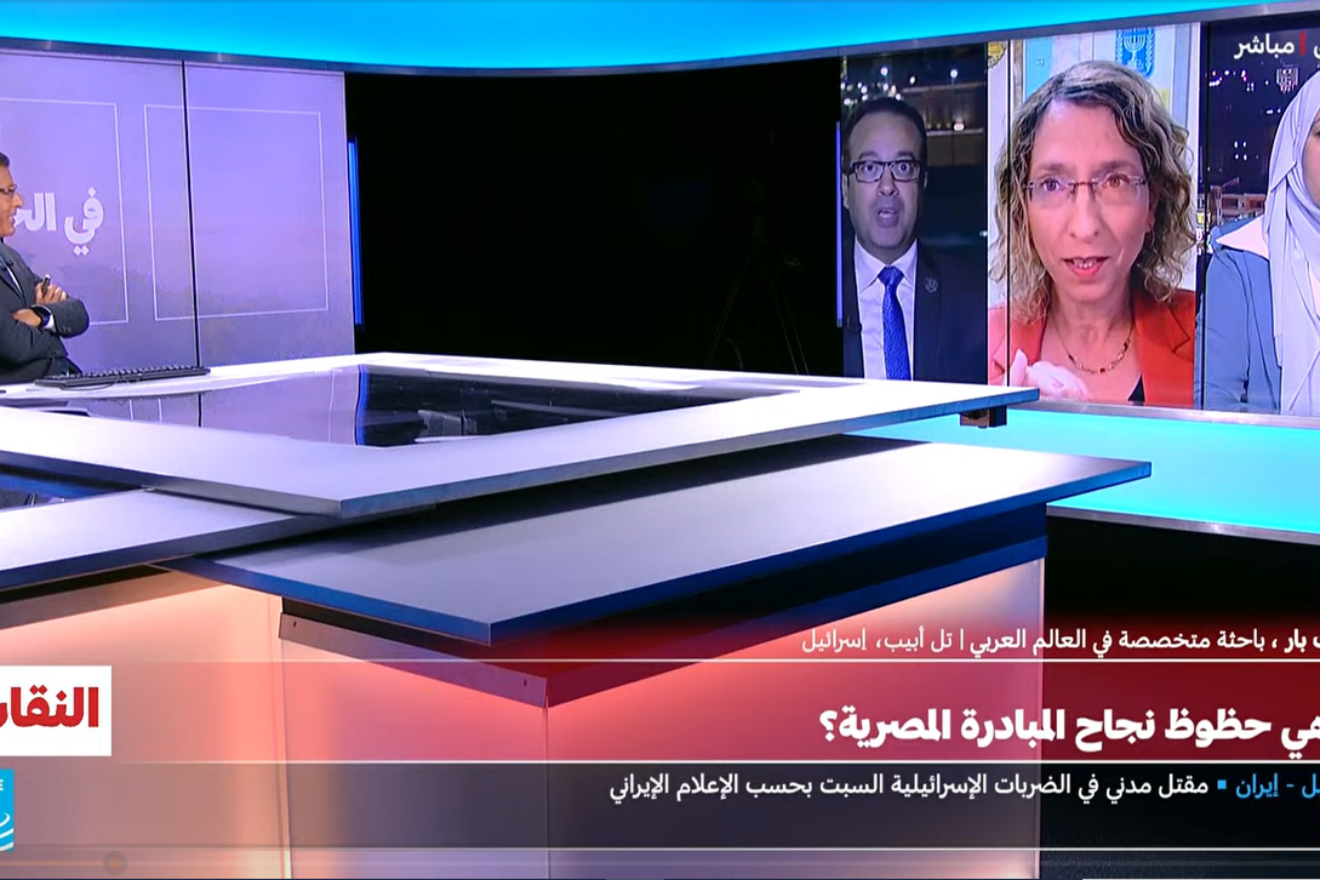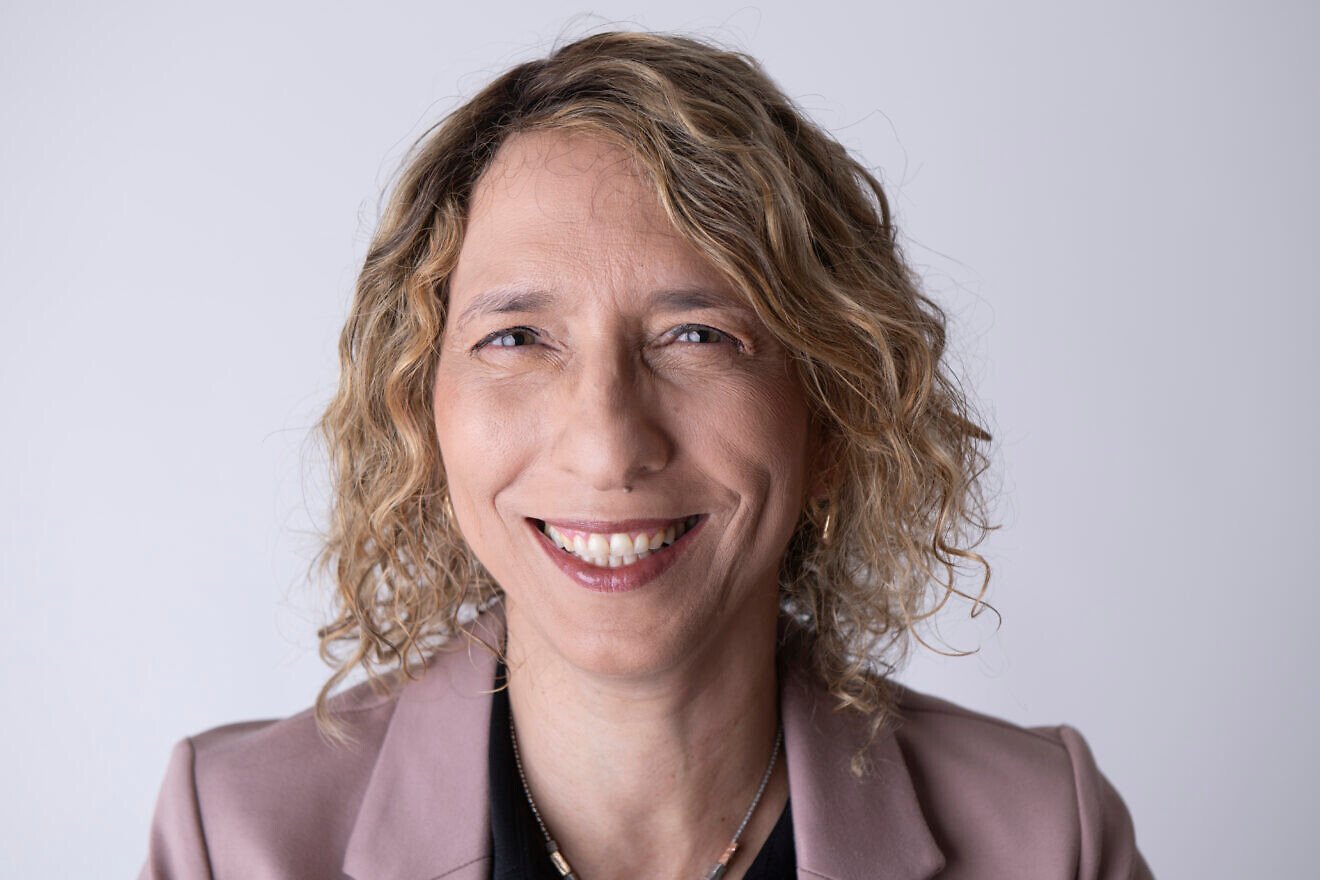by Tal Viezel
Idit Bar's voice of truth stands out in a sea of hostility.

She may be little known within her native Israel, but to millions across the Arab world, Idit Bar is a familiar face and a formidable voice.
A scholar of Islam, fluent Arabic speaker, and unrelenting advocate for the Israeli narrative, Bar has emerged as a singular figure in the public diplomacy battlefield—appearing on hostile Arabic-language TV networks and social media platforms to challenge decades of entrenched hatred and misinformation about Israel.
“Without knowledge of Arabic, we’re like blind people in the dark,” Bar says. Since the October 7 massacre, she has been filling a glaring void in Israel’s public diplomacy. Appearing live on major Arab outlets—often facing former intelligence officials or leading editors—she articulates Israel’s case with clarity and conviction, fearlessly confronting narratives rooted in deep historical bias and modern-day incitement.
Bar does not enter these arenas unprepared. “They bring seasoned, sophisticated speakers with impressive credentials—former generals, diplomats. I come armed with facts,” she says. “Because I speak Arabic fluently, they can’t confuse me. I know their culture, their history and their references. That makes me more dangerous to them than an IDF soldier.”

On the frontlines of “hasbara”
Bar’s journey to the frontline of Israeli hasbara (public diplomacy) was not by design. “I’m a researcher of Muslim society and culture,” she explains. “I never imagined I’d be doing this. But as the saying goes, ‘Where there are no people, strive to be a person.’ Or in this case, a woman.”
She is the only Israeli woman who appears regularly on Arabic media platforms. “People say I’m brave. But what choice do I have? Should I sit back while they lie about us?”
She pays a price. Bar receives threats, especially from Egyptians and Jordanians. She recalls being recognized by local women in Morocco—TikTok viewers who had seen her interviews. “We ran. I’m not a celebrity, but my face is known. And that’s risky.”
Arabic: A weapon and a bridge
“Knowledge of Arabic is a kind of power—especially in times like these,” Bar says. It allows her not only to speak to Arabs on their terms but to understand their internal discourse. “When I give lectures, I can bring authentic materials—videos, blogs, sermons. It’s not second-hand knowledge.”
Bar emphasizes that understanding the enemy also allows Israelis to detect early warning signs—something tragically lacking before Oct. 7. “We weren’t ignorant because the signs weren’t there,” she says. “We were ignorant because we couldn’t read them.”
In addition to media appearances, Bar speaks at conferences, business forums, and schools, urging Israelis to recognize the cultural dynamics that shape Arab societies. Her messages are blunt. “If you’re doing business in the Gulf, never mock religion. Even if you’re secular, even if you don’t care, respect matters. An Arab who sees you disrespect your own culture will never trust you.”
The need to teach ourselves
Bar is alarmed by what she calls a growing void in Israeli education. “Our students know almost nothing about our history—Jewish history, Zionism, the wars. And in religious schools, Arabic isn’t taught seriously, if at all.”
She once taught Arabic in high schools and now helps develop curricula for Israel’s Ministry of Education. Her message is urgent: “Arabic isn’t a hobby. It’s existential.”
She warns against dismissing the influence of decades of Arab propaganda. “In Egypt, despite a peace treaty, the hatred is cultivated from childhood. Textbooks portray Jews as treacherous. TV dramas during Ramadan show us as bloodthirsty villains. This seeps into the culture deeply.”
An insider’s perspective
Bar’s understanding of Arab culture is both academic and personal. Her family history is steeped in Middle Eastern Jewish experience. Her maternal grandmother lived in Jerusalem’s Silwan neighborhood and was fluent in Arabic. Her father’s family were crypto-Jews in Mashhad, Iran, who outwardly lived as Muslims.
She received an MA in Arabic and Islam from the Hebrew University of Jerusalem, where she studied with some of Israel’s most prominent Middle East scholars. Yet she intentionally stepped away from academia to ground herself in real-world engagement.
“Academia is often theoretical,” she says. “I wanted to connect with reality. I’ve taught in defense institutions, where you see what knowledge can really do.”
Her insights reflect years of immersion in Islamic texts and modern Arab discourse. She is currently rereading the Quran to sharpen her tools in the ideological battle.
“You have to know their foundations to understand groups like Hamas or Islamic Jihad,” she says. “Their goals are rooted in religious ideology. We ignore that at our peril.”
A lone voice, but not alone
Bar’s work is often solitary, but not without impact. She maintains a growing presence on Arabic social media—especially Twitter—where she shares facts, historical context, and direct rebuttals to falsehoods. “It’s slow, but the ripples are real. Sometimes a Moroccan journalist messages me in support. Once, a sheikh responded to my post about Jewish history and agreed: ‘This land is truly yours, the land of the Israelites.’”
Still, she’s realistic. “There are a few who see the truth, but the indoctrination is massive. Most of the Arab world has been fed hatred for generations. It’s not going to vanish because of one post.”
Bar is not naïve about the limitations of her work. In one instance, she was invited to an Arabic program where the producers tried to set her up for an internal Israeli fight, pairing her with Haaretz journalist Gideon Levy.
“They wanted me to debate him in Arabic while they applauded,” she says. “I refused. There are things you can criticize in Hebrew, at home—not in front of people who want to see us divided.”
Her composure and sense of purpose are rooted in both scholarship and identity. Although she is secular, she lives with her religiously observant husband and children in Modi’in and feels deeply connected to her Jewish roots and mission.
“I remind students in every lecture: you are the next generation of Israeli advocacy. If you don’t understand Arabic, if you don’t understand our history, then you won’t know how to respond. And that’s how we lose the war of words.”
In a region where perception can be as powerful as policy, Idit Bar is Israel’s unlikely warrior—armed not with weapons, but with words, wisdom and unwavering courage.
A version of this article was first published in Hebrew by Olam Katan.
Tal Viezel
Source: https://www.jns.org/the-israeli-woman-who-speaks-to-the-arab-world/
No comments:
Post a Comment